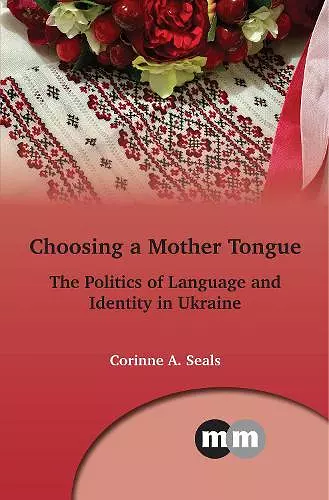Choosing a Mother Tongue
The Politics of Language and Identity in Ukraine
Format:Paperback
Publisher:Multilingual Matters
Published:12th Nov '24
Should be back in stock very soon
This paperback is available in another edition too:
- Hardback£114.95(9781788924993)

The first book to document the ‘changing your mother tongue’ movement
This book investigates narrative accounts of language and politics in Ukraine, including the ongoing Russian-Ukrainian war, providing a detailed analysis of how national and linguistic identity are discursively renegotiated during a time of mass conflict. It examines connections between language, identity and politics in Ukraine and the diaspora.
This book presents a sociocultural linguistic analysis of discourses of conflict, as well as an examination of how linguistic identity is embodied, negotiated and realized during a time of war. It provides new insights regarding multilingualism among Ukrainians in Ukraine and in the diaspora of New Zealand, the US and Canada, and sheds light on the impact of the Russian-Ukrainian war on language attitudes among Ukrainians around the world. Crucially, it features an analysis of a new movement in Ukraine that developed during the course of the war – ‘changing your mother tongue’, which embodies what it is to renegotiate linguistic identity. It will be of value to researchers, faculty, and students in the areas of linguistics, Slavic studies, history, politics, anthropology, sociology and international affairs, as well as those interested in Ukrainian affairs more generally.
This book is open access under a CC BY NC ND licence.
Seals examines language and identity among Ukrainians in Ukraine and in diaspora in great depth, introducing for the first time in sociolinguistics the discourse of ‘changing your mother tongue’ which occurred throughout the narratives of the Ukrainians interviewed by her from 2009 to 2015. The result is a masterful study of language and identity among Ukrainians after the Orange Revolution and during a time of war.
* Andrii Danylenko, Pace University, USA *This is a compelling text set against the backdrop of the 2014-2015 war in Ukraine. Complex questions on language, imagined identities, investment, and nationhood are addressed with great skill and exemplary scholarship. Corinne Seals has made an outstanding contribution to contemporary debates on language and identity.
* Bonny Norton, University of British Columbia, Canada *Corinne Seals deftly combines fine-grained discourse analysis with a transnational perspective, shedding new light on the dynamics of language and identity construction in Ukraine and its diasporas. This is a valuable book for sociolinguists and regional scholars interested in the impact of the ongoing war on national ideologies and linguistic choices.
* Laada Bilaniuk, University of Washington, USA *The author has included discussions of the theoretical approaches and concepts used throughout the text [...] these are brought to life by the numerous excerpts from participant interviews which are included throughout, enabling the reader to gain insights into the political and linguistic journeys made by participants in Ukraine and the Ukrainian diaspora.
-- Sue Edwards, Waikato Institute of Technology, Hamilton, New Zealand * TESOLANZ 29 *As the bulk of the interviews [in the book] were conducted soon after Euromaidan and the beginning of the Russian-Ukrainian war, most of the presented excerpts discuss the impact of these developments on the interviewees’ identities and language ideologies. This impact has already been established in numerous survey-based studies demonstrating Ukrainian residents’ increased identification, after the tumultuous events of 2014, with the Ukrainian nationality and native language, as well as their stronger embrace of Ukraine as one’s homeland. The valuable addition of Seals’s book to these findings is its vivid demonstration of an underlying motivation of the change.
-- Volodymyr Kulyk, National Academy of Sciences of Ukraine * Harvard Ukrainian Studies 38, no. 1–2 *...it is a pleasure to recommend this book to several audiences. Novice linguists will delight in how sociolinguistic concepts are brought to life. Students interested in discourse analysis will benefit from scholarly examples of oral-text interpretation. The narratives of these young Ukrainians offer a better understanding of the complexity of the country’s language question, and provide insights into the struggles of imagined identities in the diaspora.
Those with specific attitudes to events in Ukraine will be coaxed into critical engagement by the similarities and divergences expressed by young people – some of whom will become the leaders shaping Ukraine’s future.
Choosing a Mother Tongue is a remarkable illustration of the current meta-discursive debate concerning language ideology in Ukraine [...] The volume gives us an opportunity to not only better and more fully understand the linguistic and cultural specificity of the language situation in Ukraine, but also allows a glimpse of the processes of identity construction in discourse and through discourse.
-- Valentyna Ushchyna, University of Pittsburgh, USA * Language in Society 49 (2020) *Seals presents a multifaceted and elegantly cohesive depiction of the linguistic situation in Ukraine and its diaspora communities. In addition, though speaking about a specific people, she presents a nuanced picture of its individual members, successfully working around the problem of essentialization that typically accompanies this type of research.
-- Tracey Adams, University of Texas at Austin, USA * LINGUIST List 31.2015 *Seals' book is an empirically rich, theoretically relevant and stylistically approachable contribution. It will be of value to scholars working on language and identity in post-soviet contexts, or contexts of migration, and to those interested in language shift and language maintenance. It also has an easy to read style, which makes it relevant to advanced scholars as well as those who are new to the field.
-- Lydia Catedral, City University of Hong Kong * Language and Education, 20ISBN: 9781788925679
Dimensions: 234mm x 156mm x 12mm
Weight: 360g
224 pages